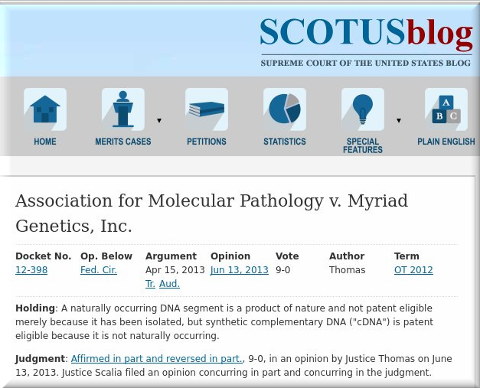
Reference: Association for Molecular Pathology v Myriad Genetics, Inc. | Wikipedia
Summary: The old riddle about whether naturally-occurring phenomena are patentable or not, in light of some very recent news (the past couple of days)
THE USPTO does not, in general, permit patents on genetics. The EPO has just opposed it, so it can be seen as hanging in the balance (the appeal boards will need to step in and decide).
A few days ago we wrote about
life patents (e.g. patents on cancer treatments which aren't even drugs/chemicals). There are many different aspects to "life sciences" (a relatively new term if not buzzwords) and they should be considered in isolation: there's genetics, there's medicine, there's treatment, there's medical equipment and so on. They're not the same thing.
Days ago we revisited
the scam which Allergan set up with the Saint Regis Mohawk Tribe. IAM, not to our surprise,
wrote about it under the "life sciences" banner yesterday. Adam Houldsworth wrote: [
via]
Allergan sovereign immunity strategy rejected – Allergan’s effort to make patents relating to its Restasis dry-eye treatment exempt from Patent Trial and Appeal Board cancellation proceedings by transferring them to the Saint Regis Mohawk Tribe suffered a serious blow last week. The board ruled that the tribe’s sovereign immunity does not extend to inter partes review, and that a Restasis patent should be subject to proceedings initiated by Mylan. This followed months of controversy surrounding the deal, which was seen by some as an attempt to circumvent the patent system and by others as a means of protecting important assets from a problematic administrative proceeding. The St Regis Mohawks have stated they will appeal the PTAB decision.
These are not "assets" but monopolies and PTAB is not "a problematic administrative proceeding." But remember that this is IAM, a PTAB basher like Watchtroll,
Patently-O,
Patent Docs and a few other blogs we monitor for their anti-PTAB slant.
Yesterday we saw
this blog post from
an anti-PTAB site called Anticipat. This company is selling itself as a 'cure' to PTAB's work and it seems to miss the simple fact that if a patent is abstract, then it's invalid. Full stop. Here's the latest rant:
We have previously reported that PTAB judges, like Examiners, are measured by a quota-based production system. For PTAB judges, the quota is based on the number of decisions they author. It is no secret that this production system prompts some Examiners and PTAB judges at times to get creative with practices to most easily meet their quotas. Here, we look at some recent decisions that show a pattern of PTAB judges deciding a Section 101 rejection without looking to the remaining pending grounds on appeal.
Why should they? Again, like we said above, if Section 101 applies (e.g.
Alice), then it's over. We understand that many patent trolls and parasites are afraid of PTAB. It undoes the damage caused when patents were granted in a hurry and/or in error.
"Another day of watching Supreme Court opinions to see if Oil States will come out,"
wrote one lawyer this week. "Going to be at least another two weeks."
He's wasting his time.
Oil States will likely be ruled unanimously in favour of PTAB and its much-needed IPRs. The patent system is a lot better now. SCOTUS has already named "trolls" and bemoaned the effect of frivolous patent litigation. It not only gave
Alice but also
Mayo and
Myriad. PTAB actually enforces these; so why would SCOTUS weaken PTAB now?
The situation is a tad different in Australia, probably due to pressure from the likes of
CSIRO. The Australian attorney Mark Summerfield
is now ranting about medical/clinical trial patents facing an uphill battle. To quote:
From a policy perspective, getting the balance right is particularly important in the case of pharmaceutical products. If it is too difficult to obtain a valid patent, there may be insufficient incentive for companies to invest billions of dollars in new drug development. On the other hand, it is important to keep in mind that, one way or another, it is the wider community – either individually, or through taxes in countries where healthcare is substantially subsidised by government – that ultimately pays for that development, through the higher prices charged for patented drugs. Allowing patents to be granted too easily therefore may therefore represent a significant social cost.
Australia's attitude towards patents on life was already mentioned here over the weekend.
Patent Docs, a patent maximalists' site,
wrote about it a short while ago. It's about Myriad again. To quote:
When the Australian High Court ruled against the patentability of isolated naturally occurring genes in the Myriad decision, a number of commentators believed that the decision would ultimately invalidate claims directed to methods involving the practical application of genes. A recent Federal Court decision, however, has confirmed that claims directed to methods involving the correlation of gene sequences to a particular trait in cattle are patent eligible subject matter in Australia.
Time will tell where the EPO stands on Myriad-type cases. At the moment it looks like there are forces tugging at both directions. Our position on that has always been the same: while we support
affordable life-saving drugs and usually generics (access to medicine designed to maximise public health), we aren't against patents on drugs; what we're against are attempts to patent life itself, i.e. chromosomes, genome, antibodies, DNA sequences and so on.
⬆

